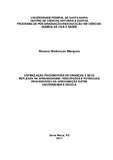| dc.creator | Marques, Rosana Niederauer | |
| dc.date.accessioned | 2018-07-27T18:28:32Z | |
| dc.date.available | 2018-07-27T18:28:32Z | |
| dc.date.issued | 2017-09-29 | |
| dc.identifier.uri | http://repositorio.ufsm.br/handle/1/13938 | |
| dc.description.abstract | Considering the benefits that the physiotherapeutic intervention, through psychomotor stimulation, can provide in a short and medium term in the development of children, regarding body control and learning, this thesis has the general goal to investigate in what way the psychomotor stimulation of schoolchildren of 4th and 5th years of elementary school, can contribute to the learning of mathematics in two schools in São João do Polêsine City. It is an action research, qualitative-quantitative approach. The participants of the study were 19 children between 9 and 12 years old, of both sexes, belonging to two schools of the São João do Polêsine City, RS. Also part of the research were the teacher regent of each class and 15 academics of the Physiotherapy course of the Federal University of Santa Maria who, in the second semester of 2016, attended the discipline Physiotherapy in Child Health. The selection of the sample was by criteria of convenience and accessibility of the researcher. In order to collect data with the children, a protocol based on the Psychomotor Battery of Vítor da Fonseca (Bateria Psicomotora de Vítor da Fonseca) (1995) was used, and to quantify the mathematical learning, a list of 25 questions was digitized and used as an electronic resource, elaborated from the Protocol California Standards Test. With the children, teachers and conductors with the academics were collected narratives related to the work developed. In addition to the results presented in the body of work, compose the results of the thesis, three articles, one published and two in the evaluation phase and one manuscript, which was a free theme in congresso. The narratives of the teachers and the academics proved the relevance of the work developed with the children and show the relevance to the physical training of the physiotherapist. It is concluded that psychomotor stimulation, corroborating the findings in the literature, favors the corporal control and consequently the learning, reinforcing the argument of the importance of the collaborative work between the University and the School, between the Health area and the Education area. | eng |
| dc.language | por | por |
| dc.publisher | Universidade Federal de Santa Maria | por |
| dc.rights | Attribution-NonCommercial-NoDerivatives 4.0 International | * |
| dc.rights.uri | http://creativecommons.org/licenses/by-nc-nd/4.0/ | * |
| dc.subject | Estimulação psicomotora | por |
| dc.subject | Ensino/aprendizagem | por |
| dc.subject | Trabalho colaborativo | por |
| dc.subject | Aprendizagem matemática | por |
| dc.subject | Psychomotor stimulation | eng |
| dc.subject | Mathematical learning | eng |
| dc.title | Estimulação psicomotora de crianças e seus reflexos na aprendizagem: percepções e potenciais provenientes da aproximação entre universidade e escola | por |
| dc.title.alternative | Psychomotor stimulation of children and the effects in early learning: perceptions and potentials arising from the approaching between university and school | eng |
| dc.type | Tese | por |
| dc.description.resumo | Acreditando nos benefícios que a intervenção fisioterapêutica, através da estimulação psicomotora, pode proporcionar a curto e médio prazo no desenvolvimento infantil, no que diz respeito ao controle corporal e aprendizagem, esta tese tem por objetivo geral investigar se a estimulação psicomotora de crianças escolares de 4º e 5º ano do ensino fundamental, pode contribuir para a aprendizagem em matemática. Trata-se de uma pesquisa-ação, de abordagem quali-quantitativa. Os participantes da pesquisa foram 19 crianças em idade entre 9 e 12 anos, de ambos os sexos, pertencentes a duas Escolas do Município de São João do Polêsine, RS. Também fizeram parte da pesquisa a professora regente de cada turma e 15 acadêmicos do Curso de Fisioterapia da Universidade Federal de Santa Maria que, no segundo semestre de 2016, frequentaram a disciplina Fisioterapia na Saúde da Criança. A seleção da amostra se deu por critério de conveniência e acessibilidade da pesquisadora. Para a coleta de dados com as crianças foi utilizado o protocolo baseado na Bateria Psicomotora de Vítor da Fonseca (1995), e para quantificar a aprendizagem matemática, foi digitalizada uma lista de 25 questões e utilizada como recurso eletrônico, elaborada a partir do protocolo California Standards Test. Com as crianças, professoras regentes e com os acadêmicos foram coletadas narrativas relativas ao trabalho desenvolvido. Além dos resultados apresentados no corpo do trabalho, compõem os resultados da tese, três artigos, um publicado e dois em fase de avaliação além de um manuscrito apresentado em congresso. As narrativas das professoras e dos acadêmicos comprovaram a relevância do trabalho desenvolvido com as crianças e mostram a relevância para a formação técnica do fisioterapeuta. Conclui-se que a estimulação psicomotora de crianças escolares, corroborando os achados na literatura, favorece o controle corporal e, consequentemente, a aprendizagem, reforçando a tese da importância do trabalho colaborativo entre a Universidade e a Escola, entre a área da Saúde e área da Educação. | por |
| dc.contributor.advisor1 | Lüdke, Everton | |
| dc.contributor.advisor1Lattes | http://lattes.cnpq.br/8399842157129152 | por |
| dc.contributor.referee1 | Tolentino Neto, Luiz Caldeira Brant de | |
| dc.contributor.referee1Lattes | http://lattes.cnpq.br/5626168979329885 | por |
| dc.contributor.referee2 | Santarosa, Maria Cecilia Pereira | |
| dc.contributor.referee2Lattes | http://lattes.cnpq.br/7310867402763253 | por |
| dc.contributor.referee3 | Boer, Noemi | |
| dc.contributor.referee3Lattes | http://lattes.cnpq.br/7067957507021073 | por |
| dc.contributor.referee4 | Vestena, Rosemar de Fátima | |
| dc.contributor.referee4Lattes | http://lattes.cnpq.br/7401450519634298 | por |
| dc.creator.Lattes | http://lattes.cnpq.br/9462002847088127 | por |
| dc.publisher.country | Brasil | por |
| dc.publisher.department | Educação em Ciências | por |
| dc.publisher.initials | UFSM | por |
| dc.publisher.program | Programa de Pós-Graduação em Educação em Ciências: Química da Vida e Saúde | por |
| dc.subject.cnpq | CNPQ::OUTROS::CIENCIAS | por |
| dc.publisher.unidade | Centro de Ciências Naturais e Exatas | por |



